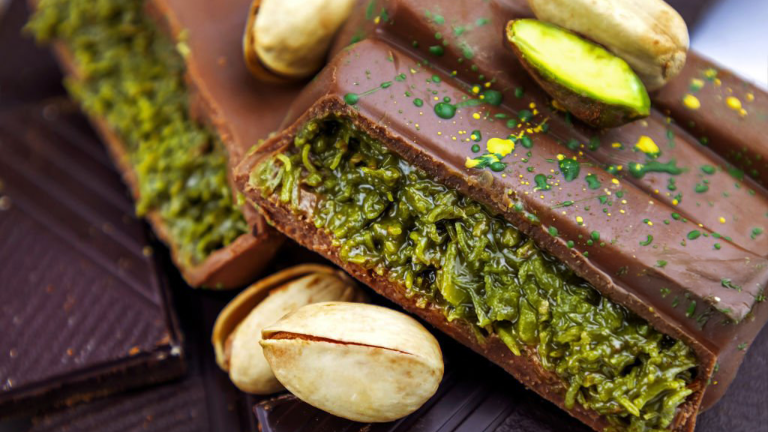Dubai chocolate, which has become widespread both in production and consumption in recent days, brings many health problems when consumed frequently. Nutrition and Dietetics Specialist Asst. Prof. Merve Bayram explained the harms of Dubai chocolate and the aspects that threaten human health.
Dubai chocolate, which started to be produced with pistachios, tahini and roasted kadayif (oven baked shredded pastry with pistachio filling in thick syrup angel’s hair dessert), has turned into a consumption frenzy with the effect of the posts on social media platforms. However, Dubai chocolate, which attracts consumers with its appearance and taste, is not as innocent as it seems. Regarding chocolate, which has become widespread in a short time, Istanbul Gelisim University (IGU) Faculty of Health Sciences Head of Nutrition and Dietetics Department Asst. Prof. Merve Bayram made significant statements.
Merve Bayram said: "Sugar, fat, caffeine and some components contained in both Dubai and other chocolates can have negative effects on the digestive system. Some of these negative properties are that it increases gastric acid and causes reflux, and it causes a burning sensation by the gastric acid escaping back into the esophagus. Also, the lactose (in milk chocolates) and sugars found in it can lead to gas formation in the bowels in some individuals. The fat and sugar in it can affect bowel movements and cause stomach cramps. This may be more evident, especially for individuals with sensitive bowel syndrome (IBS). ”
Attention those with pistachios allergies!
Dubai chocolate attracts attention with the abundance of pistachios it contains. This may pose a risk for those who are allergic to pistachios, a common allergenic substance. Asst. Prof. Merve Bayram stated, "Peanut cream can be very dangerous for people with peanut allergy and can lead to severe allergic reactions (anaphylaxis). Tahini is made from sesame seeds and can cause an allergic reaction in people with a sesame allergy. Sesame allergy can result in skin rashes, nausea, or severe allergic reactions in some people. Kadayif itself is made with gluten-containing wheat flour, so it can be problematic for people with a gluten allergy (celiac disease or gluten intolerance). In addition, kadayif may make it difficult for some people to digest if it is roasted, but it is not as common an allergen as peanuts or sesame. ”
It may increase the risk of type 2 diabetes in the long term
Referring to all possible harms of Dubai chocolate, Nutrition and Dietetics Specialist Asst. Prof. Merve Bayram also added, "Dubai chocolate contains a high amount of sugar and sugar consumption rapidly increases blood sugar. This triggers the rapid secretion of insulin and can lead to insulin resistance over time. If insulin resistance develops, the body becomes less sensitive to insulin, which may increase the risk of type 2 diabetes in the long term.”
 Created Date: : Monday, November 18, 2024
Created Date: : Monday, November 18, 2024
The photography exhibition themed “In the Paw Prints,” organized as part of...
Istanbul Gelisim University (IGU) Software Engineering Department senior st...







